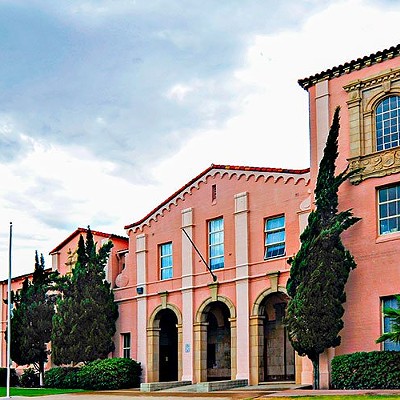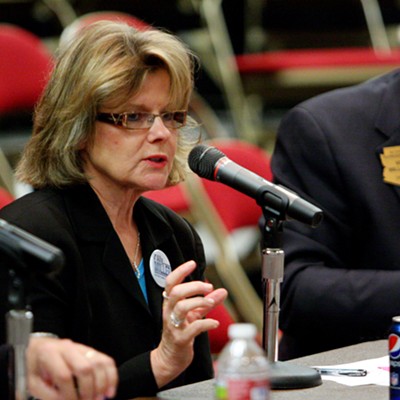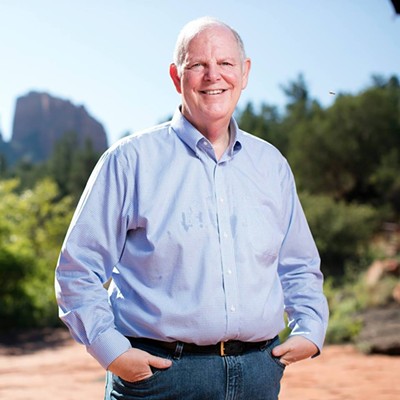The Tucson Unified School District is again putting budget-override questions before voters this year, after defeats in 2004 and 2008.
"We're giving the kids the bare bones right now," declares Judy Burns, president of the TUSD governing board, citing the $45 million in budget cuts the district has made. "This is a chance to give them what they should have."
However, not everyone agrees with Burns.
"This is the most outrageous (of the three override requests)," counters Mary Terry Schiltz, chair of BEST TUSD, a group opposing this year's effort. The group also opposed last year's budget-override request.
Two questions will be decided on Nov. 3. The first, Proposition 401, is an annual $18.5 million maintenance and operations budget override lasting seven years.
Of these funds, a total of $10.5 million would be divvied up and given yearly to schools to be used as their individual site councils decide. Another $6.5 million would go toward guaranteeing the district's existing full-day kindergarten program, with the balance being spent on technology improvements directed at Internet access and speed.
Proposition 402 would allow TUSD to spend an additional $9 million annually for seven years on technology upgrades, such as replacing approximately 10,000 classroom computers, and upgrading district operational systems.
To look at the need for improved TUSD technology, I visited midtown's Catalina High School last week, where 320 computers serve a student population exceeding 1,300.
The school has seven computer labs that are used each period, and three others which can be scheduled for use.
The computers, referred to as "clunkers" on the Catalina campus, range in age from 5 to 15 years old. A number of them were out of commission, awaiting repair.
Bandwidth capacity at Catalina is limited, leading to slow Internet access. It was lunchtime during the visit, though, so not many machines were in use, and it took about one minute for a TUSD video to appear.
Voter support of Prop 402 would increase the property tax on a home with a full cash value of $100,000 by an estimated $22.67, while approval of Prop 401 would add $46.47 a year more.
Commercial property owners would be hit harder. A business in the district with an average full cash value would see a tax increase of $563.63 annually to pay for the first proposition, and $274.96 for the second.
Schiltz argues that Prop 401 is financially redundant, since full-day kindergarten is already paid for by the state. She also points out that bond funds were approved for technological upgrades five years ago, and the district has been embroiled in legal controversies over obtaining additional federal money for this same purpose.
"It's preposterous to ask taxpayers to put out more money," Schiltz says.
Burns, a longtime critic of the district's past approaches to funding technology improvements, responds that most of the people who created the problems are no longer employed by TUSD.
Burns also fears that the deficit-riddled state will not continue to pay for full-day kindergarten: "They told us this year they weren't going to pay for it, then all of a sudden, said they were ... It's impossible to know where they're going."
Schiltz, who calls herself a strong proponent of public education, says that despite district assurances, she's not convinced the override money would actually end up being used in the classroom. She says that the Arizona Department of Education has shown that TUSD spends the lowest percentage of its budget in the classroom compared to the other 10 largest districts in the state.
Late last year, TUSD Superintendent Elizabeth Celania-Fagen indicated the district was doing its own analysis of classroom spending. (See "Shaking Things Up", Nov. 13, 2008.) However, district officials couldn't produce the results by this story's deadline.
Another point continually raised by override opponents is the district's collection of $64 million in annual property taxes under a court order for desegregation efforts.
"They already have a huge override," Schiltz says of these funds, "which is taxation without representation. At least with the propositions, we get to vote."
Burns responds by pointing out that desegregation money can only be spent in certain ways. "Every penny we use has been approved by the court in one way or another," she says.
Despite the desegregation funds, statistics from the Arizona Department of Education for the 2007-2008 school year show that TUSD didn't spend the most per pupil in Pima County. The TUSD expenditure of $8,337 is about $500 per student higher than the county average, but that amount was exceeded by both the Vail and Tanque Verde school districts.
"We're seeing other districts growing and getting more money," Burns says, "while TUSD is becoming an inner-city school district."
Tucson's largest school district has been losing students in recent years. Since reaching a peak of more than 62,000 earlier this decade, TUSD now has a total enrollment of less than 56,000.
To prevent that trend from continuing, Burns says: "I hope the voters still value public education."
Schiltz, however, says the impacts of an override approval on people, families and businesses would be "horrendous".
"We'll pay and pay again," she concludes of Propositions 401 and 402.












